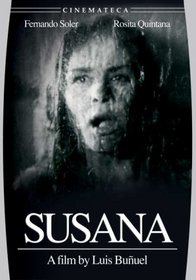| Actors: Soler, Quintana, Mendoza Director: Luis Bu˝uel Genres: Indie & Art House, Drama Sub-Genres: Indie & Art House, Drama Studio: Cinemateca Format: DVD - Black and White,Full Screen - Subtitled DVD Release Date: 11/27/2007 Original Release Date: 01/01/1953 Theatrical Release Date: 01/01/1953 Release Year: 2007 Run Time: 1hr 27min Screens: Black and White,Full Screen Number of Discs: 1 SwapaDVD Credits: 1 Total Copies: 0 Members Wishing: 14 MPAA Rating: NR (Not Rated) Languages: Spanish Subtitles: English |
Search - Susana on DVD
  | Susana Actors: Soler, Quintana, Mendoza Director: Luis Bu˝uel Genres: Indie & Art House, Drama NR 2007 1hr 27min A delinquent girl escapes from a reformatory and hides out on a plantation. Once there, she uses her feminine wiles to tempt others and turns the orderly domestic lives of those around her into a frenzied chaos. This power... more » |
Larger Image |
Movie DetailsSimilar Movies
|
Movie ReviewsLuis Bunuel describes Susana as "a perfectly routine film ab Galina | Virginia, USA | 08/14/2008 (4 out of 5 stars) "Don Luis Bunuel is the only film director who never disappointed me. I've seen 20 his films from different periods of his life, and I like a lot all of them. Each is interesting and memorable in its own way. Made in 1951 during Bunuel's Mexican period, "Susana" aka "Carne Y Demonio" or "The Devil and the Flesh" is not an exception. The story of Susana (Rosita Quintana) , a sexy fame fatal, a walking temptation, is known as a "lesser" Bunuel and the film critics and the viewers often seem to apologize for liking the film, motivating that it lacks Bunuel's trademark surrealism. Bunuel was good in everything he ever done, even in "perfectly routine" pictures, and "Susana" has his touches all over. First of all, the music fits the story very well with its sensual creepiness. Bunuel's cinematography is masterful. The opening scene in the solitary reformatory cell is appropriately dark, devastating but in general - ironic when Susana is able to escape after praying to God and asking Him for help. One of the night scenes shot from three angles when three men watch the object of their desire thru the window is a work of art. The eponymous heroine of the film is a bad girl, a sensuous troublemaker who ruins the established order of one family's life simply by being there but pay attention how much in love is the camera with her. She is a walking temptation which is hard to resist. Susana has no regrets, no scruples regarding her goals and the ways to reach them but the truth of the matter is that she is young, beautiful, and irresistibly desirable for every male she simply passes by. The final sequence of the movie is a pure Bunuel and it is sarcastic in his best traditions. The storm has passed, everyone seems happy in Don Guadalupe's household after Susana was returned to prison by force, even Don Guadalupe's favorite Arabian mare recovered after serious illness . Everyone praises the Lord and ready to forget that Susana ever happened in their lives and to move on. Well, something tells me it would not be very easy to shake the memories of Susana for everyone who knew her." Soap Opera Surrealism? PristineAngie_dot_com | NYC | 06/14/2008 (4 out of 5 stars) "A woman is dragged into a reform school for girls. We are not told what she has done, but apparently, it's bad enough to be a rough, hardcore solitary prison cell. She prays for a miracle and breaks free. She comes upon a Mexican hacienda occupied by a super nice and decent family, complete with ranch help. Using her beauty, she proceeds to wreak havoc by separately seducing each of the male members on the ranch, then pitting them against each other. What are the other women - the estate owner's wife and head maid - to do? The movie slowly builds to a maddening crescendo, leaving us to wonder who will get the boot from the estate and who will be the last to remain standing; will decency triumph over lust?
Luis Bunuel, director of Un Chien Andalou and L'Age D'Or - two surrealistic masterpieces that involved Salvador Dali in the production and were seen as the birth of experimental cinema - made this film in 1951. It is uncharacteristically "normal" on the surface. In fact, if you didn't look at the credits, it could have just as well been a soap opera. It has an age old story and themes most people can relate to: Does beauty blind people? Will youth trump experience? Will might make right? Can book smarts outsmart feminine wiles? Once you discover Luis Bunuel was behind the camera, then you start recognizing all the surrealist themes. There's the all-out assault on establishment. Then there's the individual dream state each man enters under the spell of Susana; her beauty is really a vehicle for Bunuel to question the integrity of sight, and how easily we can be deceived. There's also that earthy fascination with dirt on a human body, and of course: that wonderful recurring jingling sound in Bunuel films, now embodied in the spurs. All in all, an entertaining film. It shows that our man behind the curtains could have effortlessly gone mainstream had he chose to. Just don't expect razor blades, exploding eyeballs, or body doubles in parallel universes." |






